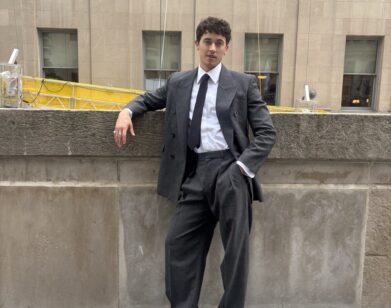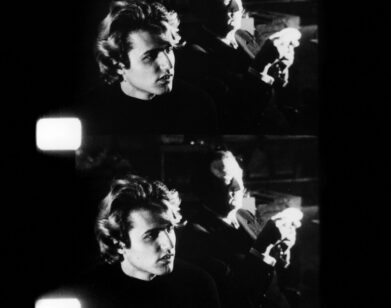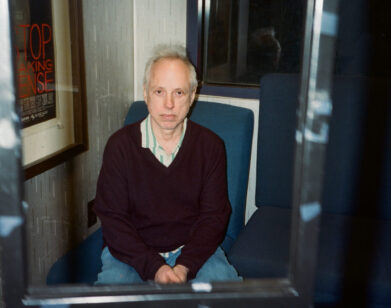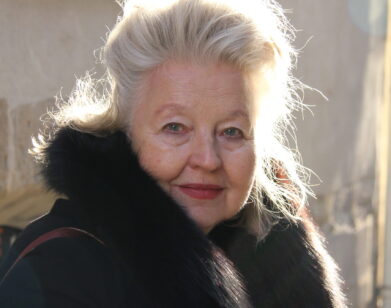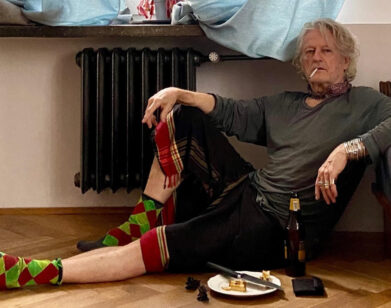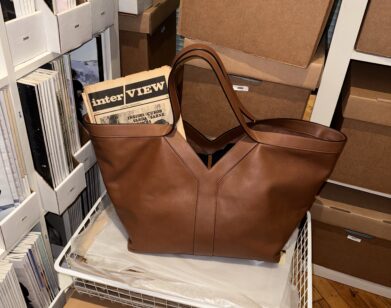Claire Denis is in No Rush to Make Films for You — Or Anyone, Besides Herself

Claire Denis on the set of Friday Night. Courtesy Everett Collection.
Any Claire Denis film comes saddled with expectations. In viewing them over time, one learns to anticipate certain tendencies that the French director carries on across her body of work: periods of silence, a minimal exchange of words, a significant use of exchanged glances. She makes use of familiar recycled faces. Isolation, displacement, the cause and effect of longing and loneliness. Her films utilize songs in a distinctive way, such as Corona’s “Rhythm of the Night” in 1999’s Beau Travail or the Commodores’ “Nightshift” in her 2008 romance 35 Shots of Rum. A running commentary on contemporary society in-situ or relationships between father and daughter. An occasional taboo. Denis’s films exude a corporeal feeling of a slow burn with effects that linger long after the credits roll.
Her latest film, High Life, is set in a shipping container-like spacecraft designed by Olafur Eliasson (a reminiscence of the textures found in Andrei Tarkovsky’s Solaris, perhaps). Here, inmates on death row are offered an alternative to life in prison with a trip into the impartial void of space to harvest energy from a black hole. Despite the empty promise of an eventual return to Earth, serving time in space sounds a bit sweeter than a lifetime spent in a cell, and it seems most would agree (including Denis herself). High Life features Robert Pattinson, who displays a heretofore unseen fatherly tenderness. Mia Goth is cast as his hyper-neurotic partner. Andre Benjamin runs on a cool autopilot. And as has been widely discussed, Denis’s longtime muse, Juliette Binoche, steals her scenes playing a foreboding shaman who seems most aware of what this journey has in store for its participants. For Denis, it’s perhaps the most bankable cast she’s worked with, not to mention the first time she’s made an English-language feature. This combination brings a strange equilibrium to the disorienting (and at points nauseating) nonlinear timeline of the film.
The morning before the US release of High Life, Interview spoke with Denis in the hazy lounge of the Bowery Hotel. As we sat down, she requested a simple espresso and a glass of water before getting up, a burgundy tassel in hand. “I have to go drop this first,” she announced. At a suggestion that she take her time, Denis replied frankly, and without turning back, “No, I am not rushing.” For a conversation that covered her relationship with the recently passed director Agnès Varda, her connection to Robert Pattinson, and one very interesting story about Jean-Luc Godard, it was the most apt introduction to a director known for her legendary frankness — and intimidating presence.
———
BROOKE HUSEBY: I went to the Metrograph screening for No Fear, No Die recently, and they said you were sick and could no longer make it to give an intro to the film.
CLAIRE DENIS: I was sick? No! What is a Metrograph?
HUSEBY: It’s that theater downtown.
DENIS: We have to make an announcement that it is not true! I did not want to do it. I wanted to do the intro to L’Intrus, but I did not know about another Q&A after. Who said such a thing?
HUSEBY: I take it you don’t enjoy Q&A’s.
DENIS: Sometimes I say, “No, I am fed up.” But this does not mean I am sick. It just means that I am tired, or that I do not want to do it. But I can choose my shoes. [DENIS points to boots with gold filigree.]
HUSEBY: Where did you find those?
DENIS: I think they’re the best shoes I’ve found in Paris. Do you like them? They’re not ridiculous, no?
HUSEBY: Absolutely not. They’re beautiful.
DENIS: Okay. Enough of the frivolities.
HUSEBY: I read that after a recent screening of High Life, someone asked you why you don’t cast strong female leads. Your response was, “What the fuck? I’m not a social worker.” Why do you think that audiences feel as though it’s your job to make films that way? Because you’re a female director?
DENIS: I am not a social worker for them! And I did do this with Juliette Binoche in Let the Sunshine In, and with Isabelle Huppert in White Material. To me, a strong female character is someone like Erin Brockovich. This is a film I would have loved to do and with the same actress [Julia Roberts]. It’s great that this film was made a long time ago, but it wasn’t meant to be a film for strong women, especially with this actress. But, she represented exactly how I feel a woman should be. I want to be attractive! I have also portrayed weak men, fragile men, who are beautiful.
HUSEBY: A strong female director just recently passed. I’m thinking of Agnès Varda.
DENIS: Agnès Varda was an amazing woman because she did things on her own when nobody could do it. Not because she was rich, like someone like Sofia Coppola. She rapidly understood that as a woman, if you wait for things to come to you, nothing would come. For that reason, she was always ahead, taking what she wanted to take. When she was going through hard times, she felt the energy not to be a victim, but an artist. I was not as brave as she was. I wanted to dwell where I liked. It was enough to be friends with Agnès Varda, and not necessary to be inspired by her. Being a woman in our time, when I started, and even a little bit today, is like this: You do not use the main entrance. You have to go through the kitchen door. That’s it.
HUSEBY: What do you mean by the kitchen door?
DENIS: Like a cook. You’re told, “Okay, try, but go through that door please.” You don’t need an example to feel that. Agnès was so self-sufficient. I really liked her when I first met her. She was not waiting. She was doing it on her own. Now, it’s fun to see how many people there are who probably never respected her as a great film artist, but would be the first ones to say about her, “Ah Agnès, Agnès…”
HUSEBY: You’re saying you don’t think people respect her work, but instead, her image?
DENIS: I do not think her work was praised a lot. In the end, yes. She never was completely apart of the Nouvelle Vague [French New Wave]. She was never accepted. To be considered as a hero in the film industry was maybe not for her as a woman.
I remember we went to a screening sometime in the 2000s. Jean-Luc Godard was introducing the film, made by his partner Anne-Marie Miéville. I was sitting next to her when the Q&A started. It was very weird because all of the questions were addressed to Jean-Luc and not Anne-Marie. He was complaining, “No, ask her. She is a real artist. I am no one.” It was like a film in which he was acting. Suddenly, Agnès looked at me and said, “I can’t stand that. I have to go. Come with me.” So, we crossed the road and we went to a cafe where we ordered wine and some sort of salad. It was summer. Eventually, Jean-Luc and Anne-Marie came inside the same cafe, passing by our table. I could clearly see they were looking our way, but not at us, as if we were transparent in that moment. Agnès was not so tall, so she stood up and said, “Jean-Luc, Jean-Luc!” He turned his head and said, “Yes, Agnès?” She replied, “Oh, I thought you didn’t see me.” Jean-Luc said, “Yes, I saw you.” Agnès asked why he didn’t say hello, and Jean-Luc said it was because she had accepted the Légion d’Honneur, an award from the French government. And Agnès told Jean-Luc, “Oh yes, I know. But unlike you, I cannot refuse anything.”
HUSEBY: Incredible.
DENIS: We also wanted to tell Jean-Luc: “Don’t be mean with us. We love you so much.”
HUSEBY: Speaking of those that you love, I want to know about your relationship with Robert Pattinson.
DENIS: Rob? I do not know what to say.
HUSEBY: What about him singing the closing song in High Life? How did this come about?
DENIS: Rob singing. [DENIS sighs.] Such a beautiful voice. He pretended that he did it by chance. I was only imitating Stuart Staples [of Tindersticks]. I didn’t believe that. He doesn’t want to be the main interest. He always pretends he was there by chance. He is very modest — but not in a sophisticated way.
HUSEBY: You’re going to be working with him again soon in an adaptation of a Denis Johnson novel.
DENIS: I wish. I have a project, but I’m not American, so I cannot say what will happen. I have to wait for a gap in his schedule and for money to come. You know this is true! There is a song in French that reminds me of this situation. It goes: “Je suis le mendiant de l’amour.” It means, “I am the beggar for love.” This is me, but I am also a piece of shit.
HUSEBY: It seems like we’re entering into a new period for film where mega-stars like Rob Pattinson or Kristen Stewart are responsible for keeping a certain type of film, made by directors such as yourself, alive.
DENIS: I had absolutely no idea it would be Robert! I wanted someone older. Everyone wanted me to meet with Daniel Craig, so I met with him in London. I wanted someone I can work with. He is such a great actor but he is someone I cannot touch. I cannot feel. I thought that if this is a film with Daniel Craig, I will have to change the script, to completely transform the story. I needed to understand the economy of the film, and Robert brought me much more than a shine or production attention — he brought me himself.
HUSEBY: How does that conversation go, when you tell an actor that you need to be able touch them?
DENIS: I said, “I am sorry Robert.” We were very shy with each other, and I said, “When we start shooting, I will have to touch you. And if I cannot touch you, then I will not know how to frame you.” He looked at me, sort of having understood, and said, “Alright.” For me, it’s hard not to love the people you cast. It is not possible just to say, “Yeah. He is a great actor. He is great for the movie.” I can understand that, but I am not strong enough to do that. I want to be loved, and I think that Robert liked me. I’m not sure if other actors were intrigued by me the way Robert was. Robert was curious. He thought I was a philosophy teacher or something. He was surprised to see a fool.
HUSEBY: From the outside, it seems like the most handsome man in the world is in love with you.
DENIS: I meant that he was intrigued by me — but in love with me? I would have died.
HUSEBY: Do you think that the prisoners in High Life knew that they were going to die? Making a pivotal choice plays a major role in almost everything you’ve ever made, so I’m curious if this choice was death via suicide on the ship or death via accepting the mission in general.
DENIS: They realized little by little that they had been cheated, but they don’t care. Between this kind of death or death row for years, I would choose this option. I bring this up because this morning there was something in the newspaper about death row. [DENIS points at her copy of the New York Times.] The ship looks like that exactly. On the other hand, it may be more exciting. There is a hope that something may happen — to succeed with the mission, to do something. There may be a future, even if it is a dangerous future. I would do the same at their age. No doubt.

